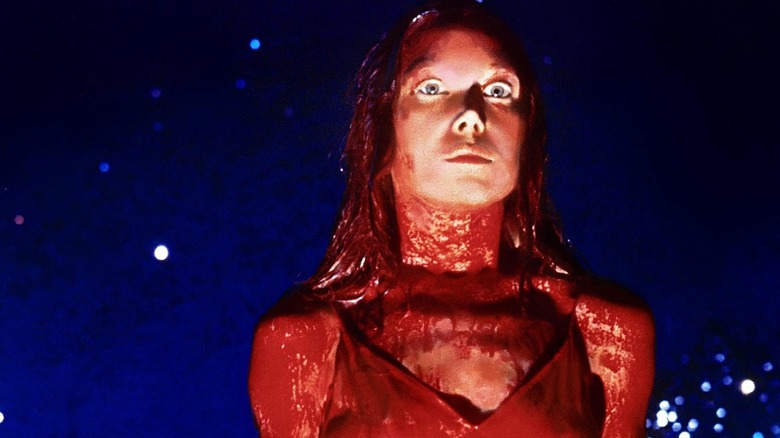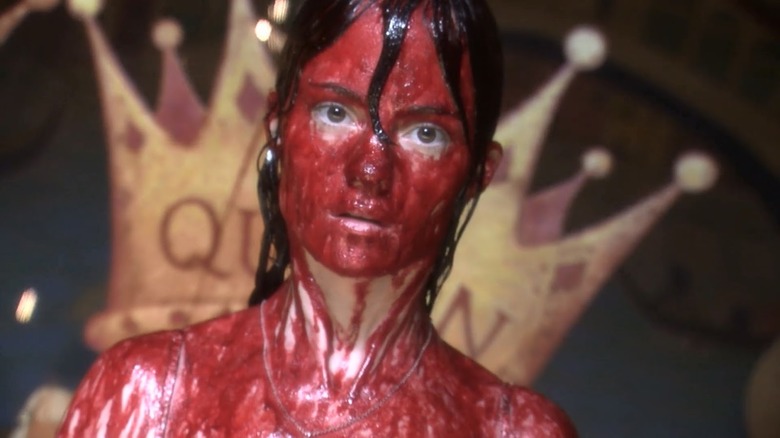Stephen King's Wife Stopped Him From Tossing Carrie In The Trash
According to a biography on Stephen King's website, the famous author's first short story was published in 1967 in an anthology paper called Startling Mystery Stories. His story was called "The Glass Floor," and King was only 18 years old. It was the first step in a decades-long literary career of overwhelming success, leading to 65 novels, 200 short stories, and dozens of feature film adaptations.
King's first major hit novel came in 1974 with the publication of "Carrie," a story about a repressed, abused teenage girl who finds that she may be developing psychic powers. Given how cruelly the world treats Carrie White, and how little her religious zealot mother wants to talk to her, an explosive, murderous conclusion was inevitable.
"Carrie" was adapted to the big screen in 1976 (seen above) by director Brian De Palma and screenwriter Lawrence D. Cohen, and it's one of the best adaptations of King's material. The film immediately became a fulcrum in horror cinema, and the "Carrie" story has been remade multiple times in the years since. There was an ill-fated stage musical in 1988. Katt Shea directed an intergenerational sequel called "The Rage: Carrie 2" in 1999. There was also a TV miniseries in 2002 (seen below), and a theatrical remake with Chloe Grace Moretz in 2013. Additionally, an episode of "Riverdale" also restaged the musical for television in 2018.
But "Carrie" almost never came to fruition.
In 2010, King wrote an outline of his theories and philosophies on writing in the fittingly titled memoir "On Writing: A Memoir of the Craft." In it, King described his techniques, as well as personal stories of his addictions, and how some of his works came to be. He revealed in "On Writing" that his wife Tabitha actually had to fish "Carrie" out of the trash after King tossed it, having thought it just wasn't very good.
Why he threw it away
Given how important "Carrie" became to the world of horror, why did King — often called the master of the genre — throw it away? It turns out there were practical reasons. For one, he was mostly writing short stories and novellas for men's magazines at the time, and "Carrie" was merely too long for the medium he was accustomed to. His story, "Sometimes They Come Back" was published in Cavalier magazine in 1974, and it would eventually become part of the "Night Shift" anthology book in 1978. Short stories were where King wanted to reside. Additionally, King said simply didn't "vibe" with the story, to use modern parlance. King wrote:
"For me writing has always been best when it's intimate, as sexy as skin on skin. With 'Carrie' I felt as if I were wearing a rubber wet-suit I couldn't pull off. [...] [M]ost important of all was the realization that the story wouldn't pay off unless it was pretty long, probably even longer than 'Sometimes They Come Back,' which had been at the absolute outer limit of what the men's magazine market could accept in terms of word-count."
Indeed, King knew that his publishers were better known for their nude cheesecake photos more than their literary content, so he was at a begrudging peace with the way his stories had to be shaved down. There needed to be enough room on the page for nudity as well as words. A whole novella like "Carrie" wouldn't fly.
Room for nudity
King explained his reasoning even further:
"You had to save plenty of room for those pictures of cheerleaders who had somehow forgotten to put on their underpants — they were what guys really bought the magazines for. I couldn't see wasting two weeks, maybe even a month, creating a novella I didn't like and wouldn't be able to sell. So I threw it away."
Luckily, Tabitha found King's incomplete first draft in the trash and thought to read through it. King was embarrassed that his wife had found a story he felt wasn't very good, but she announced that he was onto something. Tabitha would help him out with smaller details about how teenage girls operate. At her behest, he continued. As King wrote:
"The next night, when I came home from school, Tabby had the pages. She'd spied them while emptying my wastebasket, had shaken the cigarette ashes off the crumpled balls of paper, smoothed them out, and sat down to read them. She wanted me to go on with it, she said. She wanted to know the rest of the story. I told her I didn't know jack-s*** about high school girls. She said she'd help me with that part. She had her chin tilted down and was smiling in that severely cute way of hers. 'You've got something here,' she said. 'I really think you do.'"
King points out that Tabitha was right, in that he was indeed onto something. It turns out that thing was King's entire career as a novelist. Thanks to the popularity of "Carrie," King became a household name, and he has been amazingly prolific and beloved ever since. Now 75, King is still churning out works on the regular. His newest novel "Holly," a detective story, is due out in September.


